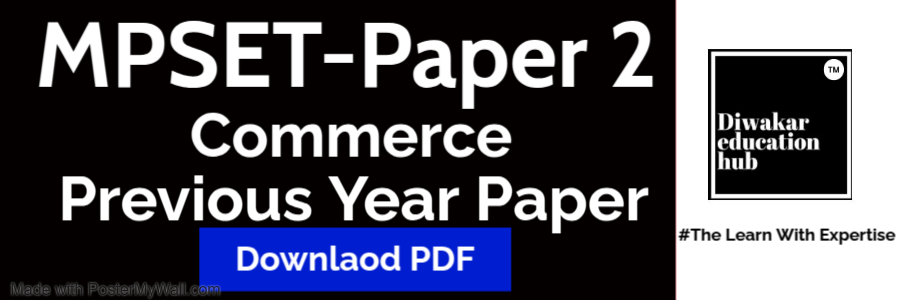
MPSET Commerce Previous Year Paper 2017,2018,2019,2020,2022,2023,2024
The Madhya Pradesh State Eligibility Test (MPSET) is conducted to determine the eligibility of candidates for the post of Assistant Professor in various universities and colleges of Madhya Pradesh. The Commerce subject is one of the most popular and competitive papers under MPSET, attracting candidates from across the state.Analyzing previous year question papers (PYQs) from 2017 to 2024 helps aspirants understand the exam pattern, weightage of topics, and level of difficulty. These papers also help in identifying the frequently asked concepts and refining exam strategies.
Table of Contents
📘 Exam Structure Overview
The MPSET Commerce exam consists of two papers:
| Paper | Type | No. of Questions | Marks | Duration | Description |
|---|---|---|---|---|---|
| Paper I | General Aptitude (Teaching & Research Aptitude) | 50 | 100 | 1 Hour | Tests reasoning, comprehension, communication, and teaching/research skills |
| Paper II | Subject-Specific (Commerce) | 100 | 200 | 2 Hours | Covers core areas of Commerce including Accounting, Management, Economics, and Business Studies |
MPSET Commerce Paper 2 Previous Year Paper
| Previous Year Paper | Link |
|---|---|
| MPSET Commerce Year 2017 | Click Here |
| MPSET Commerce Year 2018 | Click Here |
| MPSET Commerce Year 2019 | Click Here |
| MPSET Commerce Year 2020 | Click Here |
| MPSET Commerce Year 2022 | Click Here |
| MPSET CommerceYear 2023 | Click Here |
| MPSET Commerce Year 2024 | Click Here |
📊 MPSET Commerce Previous Year Paper Analysis (2017–2024)
| Year | Total Marks | Difficulty Level | Major Topics Covered | Key Highlights |
|---|---|---|---|---|
| 2017 | 300 | Moderate | Accounting Standards, Business Environment, Marketing, Microeconomics | Emphasis on classical microeconomic theories and cost analysis. Accounting standard-based numerical questions were frequent. |
| 2018 | 300 | Moderate to Hard | Management Theories, Corporate Accounting, Auditing, HRM | Conceptual and situational questions in Management; practical caselets introduced. |
| 2019 | 300 | Moderate | Financial Management, Taxation, International Business | Increase in numerical-based problems on NPV, IRR, and Dividend Policy. GST-related questions introduced. |
| 2020 | 300 | Moderate | Marketing, Organizational Behaviour, Business Law, Cost Accounting | Shift towards analytical reasoning and case-based marketing questions. More questions on Companies Act and Business Ethics. |
| 2022 | 300 | Moderate | Financial Markets, Entrepreneurship, Strategic Management | Paper focused on new trends in business environment and e-commerce; few conceptual questions on corporate governance. |
| 2023 | 300 | Moderate to Hard | Investment Analysis, Cost Accounting, International Trade | More questions from emerging areas like Digital Marketing and Business Sustainability; less emphasis on theory-based accounting. |
| 2024 | 300 | Moderate | Business Economics, Auditing, Management Accounting, HRM | Balanced paper with equal weightage to accounting, finance, and management. Trend towards practical application-based MCQs. |
📚 Topic-Wise Weightage Trend (2017–2024)
| Topic | Average Weightage (%) | Trend |
|---|---|---|
| Accounting & Auditing | 20–25% | Consistently high; questions on IFRS, AS, and auditing procedures |
| Management (HRM, OB, Theories) | 15–20% | Moderate rise; scenario-based questions common |
| Economics (Micro & Macro) | 10–15% | Fluctuating; more focus on market structures and fiscal policy |
| Business Finance & Financial Management | 15–20% | Stable; calculations on ratio analysis, cost of capital, and investment decisions |
| Marketing & International Business | 10–15% | Increasing; digital marketing and trade agreements featured |
| Taxation & Law | 10% | GST and Companies Act, 2013 important areas |
| Entrepreneurship & Business Environment | 5–10% | More relevance post-2020 due to start-up ecosystem focus |
🧩 Key Observations (2017–2024)
- Shift to Conceptual Clarity:
Recent papers test conceptual understanding rather than rote memory. - Numerical Questions Dominant:
Finance, accounting, and cost-related numericals form a substantial part of the paper. - Inclusion of Contemporary Topics:
Digital Business, CSR, and Sustainability have emerged as trending topics. - Moderate to Difficult Level:
Difficulty remains mostly moderate with occasional tricky conceptual questions. - Balanced Distribution:
Each major unit of the Commerce syllabus receives almost equal weightage across years.
🧠 Preparation Tips
- Analyze PYQs Thoroughly:
Identify recurring topics and question types from 2017–2024. - Focus on Accounting Standards & Financial Management:
These two areas consistently carry the highest marks. - Revise Core Theories:
Especially in Management, Marketing, and Economics. - Stay Updated:
Prepare on recent amendments in taxation and corporate laws. - Mock Tests & Time Management:
Practice timed tests to improve speed and accuracy.
✅ Conclusion
The MPSET Commerce Previous Year Papers (2017–2024) reveal a well-balanced and concept-oriented approach by the exam authorities. Consistency in the core topics—Accounting, Management, and Finance—indicates that mastering these areas can significantly boost scores. A strategic study plan focusing on conceptual understanding, numerical accuracy, and updated business developments is the key to success.
